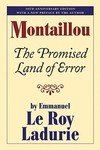Gives great insight into the life of the Cathars (Albigensians) of Montaillou, where the nearby Montsegur casts it shadow. Even years after reading this book, I still think of the lives of these 14th century peasants, bourgeois, and local clergy and their (so-called) heretical religion. Much light is shed on their lives and persecution, based on historical accounts and research; but their actual theology remains shrouded in mystery, so vociferously had it been eradicated by the Catholic Church.
If you liked Pernoud's Joan of Arc or Tuchman's A Distant Mirror, you might enjoy Montaillou.
Product Description
"Emmanuel Le Roy Ladurie has had a success which few historians experience and which is usually reserved for the winner of the Prix Goncourt...Montaillou, which is the reconstruction of the social life of a medieval village, has been acclaimed by the experts as a masterpiece of ethnographic history and by the public as a sensational revelation of the thoughts, feelings, and activities of the ordinary people of the past."Times Literary Supplement
Offers a fascinating history of a fourteenth-century village, Montaillou, in the mountainous region of southern France, almost destroyed by internal feuds and religious heterodoxy. Ladurie's portrait is based on a detailed register of Jacques Fournier, Bishop of Pamiers and future Pope Benedict XII, who conducted rigorous inquisition into heresy within his diocese. Fournier was a consummate inquisitor, an acute psychologist who was able to elicit from the accused the innermost secrets of their thoughts and actions. He was pitiless in the pursuit of error, and meticulous in recording that pursuit.
LeRoy Ladurie analyzes the behavior, demography, social mentality, and cosmology of the community of peasants and shepherds, and vividly evokes the daily life of the village and mountain pastures. His portrait of Montaillou is dominated by the personal histories of two men: the curé Pierre Clergue, a brutal and powerful man who placed his enemies in the hands of the inquisitor; and the shepherd Pierre Maury, a friend of the Albigensian perfecti and a fatalist who returned from Spain to disappear in the inquisitor's prison in his own country. Montaillou, which has received even more praise than LeRoy Ladurie's earlier work, provides a portrait of a fascinating place with a dark, intriguing history.
If you liked Pernoud's Joan of Arc or Tuchman's A Distant Mirror, you might enjoy Montaillou.
Product Description
"Emmanuel Le Roy Ladurie has had a success which few historians experience and which is usually reserved for the winner of the Prix Goncourt...Montaillou, which is the reconstruction of the social life of a medieval village, has been acclaimed by the experts as a masterpiece of ethnographic history and by the public as a sensational revelation of the thoughts, feelings, and activities of the ordinary people of the past."Times Literary Supplement
Offers a fascinating history of a fourteenth-century village, Montaillou, in the mountainous region of southern France, almost destroyed by internal feuds and religious heterodoxy. Ladurie's portrait is based on a detailed register of Jacques Fournier, Bishop of Pamiers and future Pope Benedict XII, who conducted rigorous inquisition into heresy within his diocese. Fournier was a consummate inquisitor, an acute psychologist who was able to elicit from the accused the innermost secrets of their thoughts and actions. He was pitiless in the pursuit of error, and meticulous in recording that pursuit.
LeRoy Ladurie analyzes the behavior, demography, social mentality, and cosmology of the community of peasants and shepherds, and vividly evokes the daily life of the village and mountain pastures. His portrait of Montaillou is dominated by the personal histories of two men: the curé Pierre Clergue, a brutal and powerful man who placed his enemies in the hands of the inquisitor; and the shepherd Pierre Maury, a friend of the Albigensian perfecti and a fatalist who returned from Spain to disappear in the inquisitor's prison in his own country. Montaillou, which has received even more praise than LeRoy Ladurie's earlier work, provides a portrait of a fascinating place with a dark, intriguing history.




